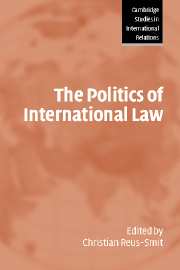Book contents
- Frontmatter
- Contents
- List of contributors
- Preface
- 1 Introduction
- 2 The politics of international law
- 3 When states use armed force
- 4 Soft law, hard politics, and the Climate Change Treaty
- 5 Emerging customary norms and anti-personnel landmines
- 6 International law, politics, and migrant rights
- 7 The International Criminal Court
- 8 The Kosovo bombing campaign
- 9 International financial institutions
- 10 Law, politics, and international governance
- 11 Society, power, and ethics
- Bibliography
- Index
- CAMBRIDGE STUDIES IN INTERNATIONAL RELATIONS
10 - Law, politics, and international governance
Published online by Cambridge University Press: 22 September 2009
- Frontmatter
- Contents
- List of contributors
- Preface
- 1 Introduction
- 2 The politics of international law
- 3 When states use armed force
- 4 Soft law, hard politics, and the Climate Change Treaty
- 5 Emerging customary norms and anti-personnel landmines
- 6 International law, politics, and migrant rights
- 7 The International Criminal Court
- 8 The Kosovo bombing campaign
- 9 International financial institutions
- 10 Law, politics, and international governance
- 11 Society, power, and ethics
- Bibliography
- Index
- CAMBRIDGE STUDIES IN INTERNATIONAL RELATIONS
Summary
The politics of international law are inextricably linked to the issue of governance. In this chapter we approach the central themes of the book by considering this vexed issue, developing four key arguments. First, we define and conceptualise institutions and governance so that any alleged distinction between law and politics becomes untenable or irrelevant. Our claim here directly addresses two of the three questions put forward by Christian Reus-Smit (in chapters 1 and 2) as animating this book: How should we think of international law and international politics? What is the relationship between the two? Our empirical discussion responds to the third question: How does rethinking these categories enable us better to understand contemporary international relations? We agree with Reus-Smit that international law and politics infuse and shape each other, although we understand this relationship somewhat differently. Second, we are concerned with the sources and uses of power in international society. Elaborating on the distinction drawn by Reus-Smit between realist and constructivist approaches, we distinguish normative-ideational power (influence through argumentation and suasion, dear to constructivists) from material-physical power (influence through the manipulation of threats and coercion, emphasised by realists). Third, we develop a relatively abstract model of how institutions emerge and evolve in two kinds of social settings: the dyadic and the triadic. Finally, we illustrate our theoretical ideas with reference to the development of triadic forms of governance in the context of the General Agreement on Tariffs and Trade (GATT), and of dyadic forms in the case of forcible humanitarian intervention.
- Type
- Chapter
- Information
- The Politics of International Law , pp. 238 - 271Publisher: Cambridge University PressPrint publication year: 2004
- 21
- Cited by



